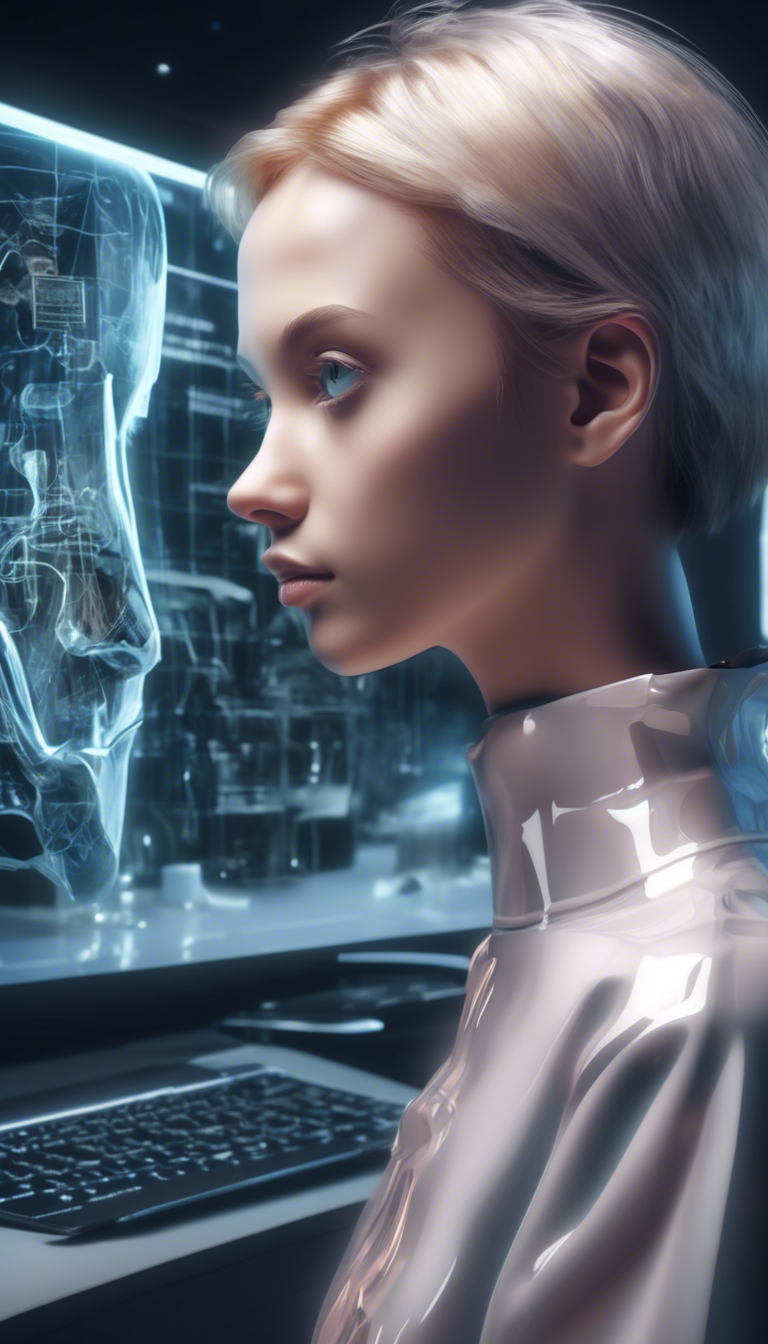The Role of AI in Enhancing Website User Experience
In today’s digital landscape, the significance of user experience (UX) on websites cannot be overstated. A well-designed website is more than just visually appealing; it must also provide a seamless and intuitive experience for users. This is where AI, or artificial intelligence, steps in to revolutionize how websites interface with their visitors.
AI technologies have a profound impact on website user experience by personalizing content and tailoring interactions. These advanced algorithms analyze user behavior, preferences, and trends, allowing websites to adapt in real-time. The result is a more engaging experience that resonates with individual users.
By leveraging AI tools, businesses can gain insights into customer behavior, enabling them to create targeted strategies that enhance user satisfaction. Here’s how AI is reshaping user experience across various dimensions:
- Personalization: AI algorithms analyze user data to offer personalized recommendations and content. When a user visits a website, AI can suggest products, services, or articles based on their previous interactions. This tailored approach significantly increases the chances of conversion and keeps users engaged.
- Chatbots and Virtual Assistants: Implementing AI-powered chatbots can transform customer service. These tools provide instant responses to user inquiries, guiding them through their journey without the need for human intervention. Chatbots are available 24/7, ensuring users receive assistance anytime, which enhances satisfaction.
- Predictive Analytics: AI can forecast future user behavior based on past actions. This predictive capability allows businesses to anticipate user needs, ensuring that content, offers, and services are presented at the right time. These insights improve the overall website experience and increase user retention rates.
- Voice Search Optimization: With the rise of voice-activated devices, AI has the potential to enhance user experience through voice search integration. Websites optimized for voice search offer a convenient alternative to traditional search methods, making information more accessible and improving overall usability.
- A/B Testing and Optimization: AI tools can facilitate smarter A/B testing, enabling website owners to experiment with different layouts, content, and design elements efficiently. By analyzing user responses, AI can determine which version performs better and suggest the most effective changes.
An essential aspect of enhancing website user experience through AI also lies in ensuring users have easy navigation. AI can streamline website navigation by analyzing user engagement metrics and identifying common pain points. For instance, if users consistently abandon their carts or struggle to find certain information, AI can suggest design enhancements to minimize these obstacles.
Additionally, AI plays a crucial role in enhancing accessibility on websites. Features like automatic text-to-speech, language translation, and alternative text for images make content accessible to a broader audience. By accommodating users with disabilities or language barriers, websites not only improve user experience but also expand their reach and inclusivity.
Furthermore, website speed is a vital component of UX, and AI can optimize performance dramatically. Through real-time analysis and adaptive algorithms, AI can streamline loading processes and optimize image sizes, ensuring faster load times. A swift website keeps users engaged and reduces bounce rates.
Content management becomes more efficient with AI as well. AI-driven systems automate the organization and formatting of content, ensuring that the most relevant information is prominently displayed. This helps maintain a consistent flow of engaging content that resonates with users, keeping them on-site longer.
AI into website design is not merely a trend; it’s an essential strategy for businesses aiming to foster meaningful connections with users. By enhancing personalization, accessibility, and navigation while optimizing performance, AI transforms static websites into dynamic platforms that adapt to user needs.
As technology continues to evolve, the role of AI in maximizing website user experience will undoubtedly expand. Companies that harness this powerful tool will not only improve user satisfaction but also set themselves apart in an increasingly competitive online environment.
The integration of AI in enhancing website user experience serves as a game changer. Those who embrace this technology can expect to see improved engagement, higher conversion rates, and greater overall satisfaction among their users. As AI evolves, so too will the opportunities for enriching the digital experiences we provide.
Future Trends in AI-Driven Website Development
The landscape of website development is rapidly evolving, driven by advancements in artificial intelligence (AI). As businesses strive to create user-friendly and engaging digital experiences, the integration of AI technologies has become more prevalent. Several key trends are shaping the future of AI-driven website development, making it an exciting area to watch.
Personalization at Scale
One of the most significant trends is the ability to deliver personalized content to users at an unprecedented scale. AI algorithms analyze user data, behavior, and preferences, allowing websites to tailor experiences specifically for individual visitors. This personalization can manifest in various ways, such as:
- Dynamic content recommendations
- Tailored marketing messages
- Customized user interfaces
By leveraging AI, businesses can boost user engagement and conversion rates, making websites more relevant to each visitor.
Chatbots and Virtual Assistants
AI-driven chatbots are transforming the way users interact with websites. These virtual assistants provide real-time customer support, answer queries, and guide users through various processes. The advantages include:
- 24/7 availability for customer inquiries
- Instantaneous responses to common questions
- Cost-effective solutions for businesses
As natural language processing (NLP) improves, these chatbots are becoming more sophisticated, offering a seamless experience that mimics human conversation.
Automated Testing and Optimization
AI tools are streamlining the testing and optimization process for developers. Automated testing solutions can quickly identify bugs and inconsistencies, which saves time and reduces costs. According to research, companies that leverage AI for this purpose see:
- Faster deployment of web updates
- Improved site performance
- Increased user satisfaction
By utilizing AI in testing, teams can focus on enhancing user experience rather than getting bogged down by manual testing procedures.
Enhanced User Experience with AI-Powered Design
The design aspect of websites is also evolving with AI. AI-driven design tools analyze user interactions and aesthetic preferences to create visually appealing layouts. For example, platforms like Wix and Canva are now incorporating AI features that provide users with intuitive design assistance tailored to their needs. Some of the benefits include:
- Automated layout suggestions
- Color palette generation based on branding
- Accessibility improvements for diverse audiences
With AI, even those without a background in design can create stunning websites that capture user attention effectively.
Data-Driven Insights for Better Decision Making
AI analytics tools provide invaluable insights into user behavior and site performance. By interpreting vast amounts of data, these tools help businesses understand how visitors interact with their websites. Key advantages include:
- In-depth analysis of user journeys
- Identification of trends and patterns in behavior
- Projections for future user engagement
By making data-driven decisions, companies can refine their strategies to better meet user needs and expectations.
AI Security Enhancements
As AI becomes more integrated into web development, its role in cybersecurity is also expanding. AI-driven security measures can detect and mitigate potential threats faster than traditional methods. Some functions include:
- Real-time monitoring of user activity
- Pattern recognition to identify anomalies
- Automated response to potential breaches
Investing in AI security solutions helps businesses protect user data and maintain trust in their digital services.
The future of website development is undeniably linked to advancements in AI, transforming how businesses connect with their audiences. By embracing these trends, companies can stay ahead of the curve, delivering experiences that not only engage users but also foster lasting relationships. As AI continues to evolve, its potential impact on web development will only grow, making ongoing innovation essential for success in the digital landscape.
Conclusion
As we delve into the landscape of AI-driven web development, it’s clear that the impact of artificial intelligence on website user experience is both profound and transformative. The integration of AI offers a multitude of ways to enhance how users interact with digital platforms. Personalization stands at the forefront of these advancements. By utilizing data analytics and machine learning algorithms, websites can tailor content and recommendations based on individual user behaviors. This personalization fosters a more engaging environment, promoting increased user retention and satisfaction.
Moreover, AI chatbots and virtual assistants have revolutionized customer support on websites. These AI agents provide immediate responses to inquiries, enhancing the speed and efficiency of communication. This ensures that users receive timely assistance, reducing frustration and abandonment rates. As improvements in natural language processing evolve, these chatbots will become even more intuitive, capable of handling complex queries and offering a seamless interaction experience.
AI’s role in optimizing website design cannot be underestimated. Tools powered by AI analyze user behavior patterns to suggest design elements that resonate well with target audiences. For instance, color schemes, layouts, and content organization can be adjusted in real-time to improve user engagement. This data-driven approach fosters a more intuitive and user-friendly design, catering to the preferences of visitors.
Looking toward the future, we can anticipate further innovations in AI-driven website development. As technology advances, the capabilities of AI will expand, offering even more sophisticated solutions for web designers and developers. One trend likely to emerge is the rise of hyper-personalization. Websites will evolve to dynamically adapt content in real time based on a visitor’s context, location, and past interactions. This ability to tailor experiences on the fly represents the next frontier in user engagement.
Furthermore, the integration of augmented reality (AR) and virtual reality (VR) technologies into websites will drive engagement to new levels. AI can enhance these technologies by creating realistic simulations and immersive experiences that captivate users. Imagine visiting a retail website that allows you to virtually try on clothing, or experience a property tour through VR before making a decision. These innovations will redefine how users interact with online content, making websites not just platforms for information, but interactive experiences.
AI’s impact will also extend to website security. As cyber threats become increasingly sophisticated, AI can help protect websites in real-time by identifying vulnerabilities and predicting potential security breaches. By utilizing machine learning algorithms, websites can detect unusual behavior, flagging it for review and mitigating risks before they escalate. As a result, user data will be more secure, further enhancing trust in online platforms.
Looking ahead, we must consider the ethical implications of using AI in website development. With great power comes significant responsibility. Developers and organizations must prioritize transparency and ethical guidelines while using AI algorithms. Open communication about data usage, user privacy, and the decision-making processes behind AI-driven features will build trust with users. This focus on ethical practices will not only align with user expectations but will also set a standard for the industry as a whole.
As we embrace AI’s potential in enhancing website user experience and shaping future trends, the collaboration between human creativity and AI capabilities is essential. Web designers, developers, and marketers must work hand-in-hand with AI to test, iterate, and innovate continuously. This partnership will lead to more engaging websites that cater to users’ evolving needs and preferences.
In this exciting era of AI-driven website development, the overwhelming focus must be on creating user-centric experiences. By fostering a culture of continuous learning and adaptability, organizations can ensure they remain relevant in the ever-changing digital landscape. The future of web development is immensely promising, as AI technology continues to evolve. The convergence of heightened personalization, innovative design, and robust security will usher in a new wave of website engagement that benefits both businesses and users alike. Thus, it becomes imperative for those in the field to stay informed about emerging trends and to embrace the advancements that AI brings to the table. The path forward is not just about using technology—it’s about harnessing it to create meaningful connections with users, ultimately refining the way we experience the web.


